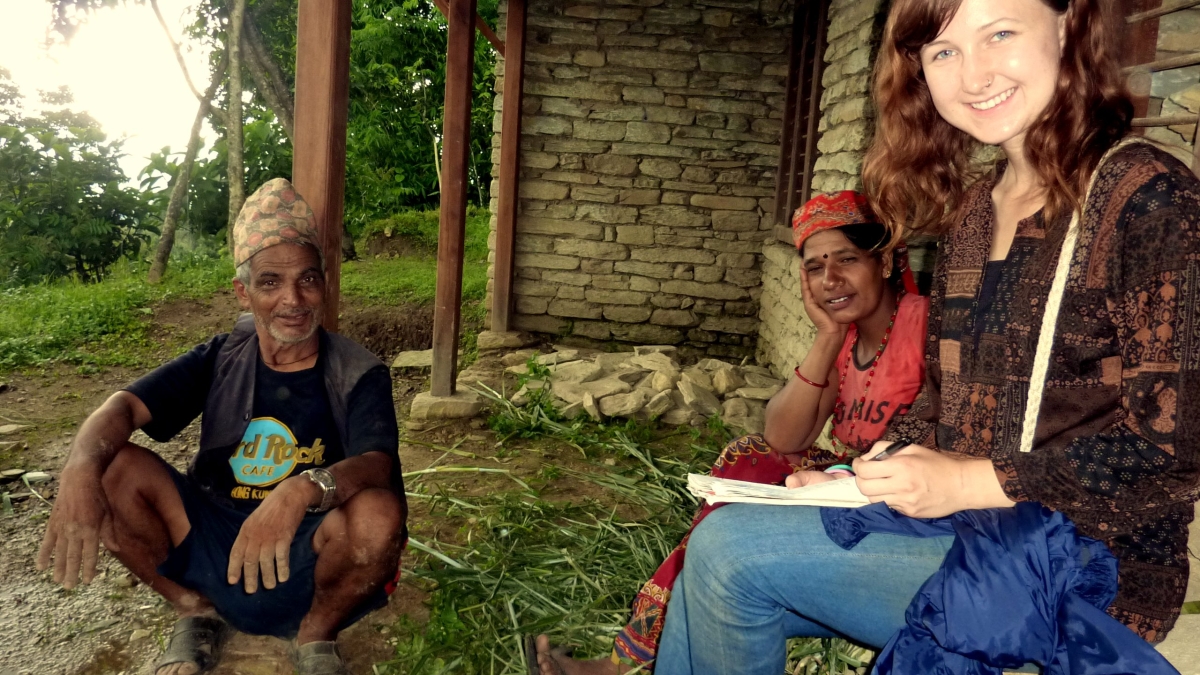ASU sustainability student examines climate change impacts on Nepali farmers

Editor's Note: This story is part of an ongoing series about student excellence at the university. To read more about some of ASU's outstanding students, click here.
In a country where she didn’t know anyone, couldn’t speak the language and was a stranger to the culture, Tayler Jenkins pushed through her mission to research sustainable agriculture and livelihoods of smallholder farmers in Nepal.
She moved into a rural village farmhouse, lived with conservation farmers, ate their food and drank their tea. She also helped them with daily chores, such as collecting buffalo excrement for composting.
Jenkins, a junior in Arizona State University’s School of Sustainability and a student in Barrett, the Honors College, traveled to the north-central Begnas village this past summer with professor Netra Chhetri and assisted him with his project, “Livestock, Livelihoods and Climate Change.” Jenkins also collected data for her honors thesis.
“Living on the farm was cool because the Nepalis have such a slow pace, but they still get things done,” Jenkins says. “They are always in the present and their time is based on the sun.”
Learning to live in a changing climate
As part of Chhetri’s project, a joint venture between ASU’s Consortium for Science, Policy, and Outcomes (CSPO) and Nepal-based nongovernmental organization Local Initiatives for Biodiversity, Research, and Development (LIBIRD), Jenkins worked and studied for three months on a typical Nepali farm: small, with no more than a few animals and a diverse selection of crops. Jenkins’ host family implements conservation farming, using compost from farm and household waste, collecting rainwater for irrigation and practicing low-impact cultivating techniques.
Unfortunately, Nepali farmers are experiencing the roughest farming conditions brought on by climate change.
“The people know the climate and they depend on rice as a main source of food,” Jenkins says. “The farmers plant the rice based on their historical knowledge of the monsoon season to naturally irrigate the crops. When the monsoon season changes just a little bit, it makes the rice yields lower because they can’t predict when to plant.”
Although smallholder farmers, like those in Nepal, contribute the least greenhouse gases, they will suffer the most, making adaptation a priority.
“In my opinion, people are people no matter where they are in the world,” Jenkins says. “We should always be willing to help wherever we think we can. It’s us in our country that is causing the climate change, and other nations are bearing the brunt of it.”
Resource management by the people, for the people
Jenkins received a Neely Foundation Food and Agriculture Sustainability Research Grant for her self-proposed thesis topic on the community-based Rupa Lake Rehabilitation and Fishery Cooperative. The co-op is organized and sustained by the community that not only reaps the economic and social benefits from the forest and fishery, but also helps protect the lake from silt pollution. By investing in environmental awareness and watershed management, the people are restoring the balance of the lake’s fragile ecosystem.
“To me that’s what sustainability is; it’s sustainable on multiple levels: social, economic and environmental,” Jenkins says. “Without my education in sustainability, I don’t think I could come to the conclusion that in order to be fully sustainable, the co-op has to be economically, socially and environmentally sustainable.”
While in Begnas, Jenkins organized focus group meetings and conducted household surveys with co-op members to investigate if it is a sustainable model for community-based natural resource management. The results will be shared in Jenkins’ final thesis. She hopes her thesis will urge others to assist small-agricultural farmers around the world so they can maintain their livelihoods.
Lessons outside of college
In addition to her school work, Jenkins is a leader in the Honor Society for Sustainability; is active in the ASU Outdoors Club and ASU’s Real Food Challenge; and is editor of the Urban Farm Lifestyle Newsletter. She applied many theories she learned in the School of Sustainability to her research in Nepal.
“In the school, they teach you about long-term thinking,” she says. “You don’t think about the immediate benefit; you think ‘Is this still going to benefit the world 20 years from now? Is this system going to exist 100 years from now?’”
Chhetri, also Jenkins’ thesis adviser, says study abroad opportunities like the one Jenkins participated in give students a more thorough outlook on education and life.
“By living and working on the farm, Tayler understood the system perspective of what sustainability is all about,” says Chhetri, an assistant professor in CSPO and the School of Geographical Sciences and Urban Planning, and a senior sustainability scientist in the Global Institute of Sustainability. “Tayler went to a farm and came out with a very applied perspective on sustainability.”
After graduating from the School of Sustainability, Jenkins plans to study urban planning in graduate school, taking her Nepal lessons with her.
“My experiences in Nepal were so different and difficult,” she says. “I didn’t understand the culture, language or customs and I had to take research out of that. Now I think, ‘If I can handle this, I can handle anything.’ I am not afraid to put myself out there; I feel capable.”
But it’s Jenkins’ unexpected life lesson that everyone can benefit from.
“I learned what it means to have a meaningful life,” she says. “In Nepal, the people are relaxed and have such strong community bonds; they have so much less than us, but I found so much happiness and generosity there. I realized that you don’t need to be constantly busy to have a meaningful life. Maybe having a meaningful life is to make someone smile or have a really nice conversation with someone. In Nepal, they see everybody as an ‘us,’ as a friend. I want to incorporate that into my own life.”